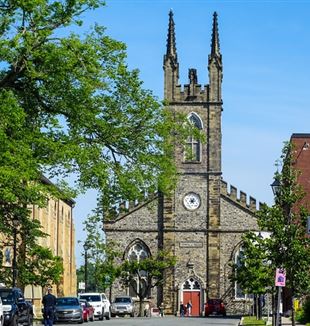
The Blind Man, Azurmendi and Me
Fr. Carron's invitation at the Beginning Day to rediscover a loyalty to the event through the example of two witnesses, has guided Fr. John throughout the months of the pandemicDuring this mysterious time of the global pandemic, we have been thrown into new, unforeseen, and restrictive circumstances which have forced us to be in front of the nothingness which often dominates our lives and ways of looking at the world and ourselves.
Since the presentation of the Beginning Day “You only see what you admire”, I have been deeply moved by the work that Fr. Julian Carrón invited me to do, to help me face reality as it is presented to me in these new circumstances. At this event, Fr. Carrón invited us to look at and recognize the work of God in the lives of two witnesses: the man born blind in the Gospel of John and the Spanish anthropologist Mikel Azurmendi. I want to share why these two witnesses have been so helpful for me in understanding the method God uses to awaken me from the slumber and distraction of nothingness.
First, Fr. Carrón highlighted through these two witnesses the importance of looking at the facts in our lives in order to learn how to deal with the common temptation of succumbing to nihilism, which he described as being an “intimacy with nothingness”.
Fr. Carrón held up the biblical story of the man born blind and his miraculous healing by Jesus as the primary example of this fidelity to facts. He wrote in the introduction: “A man born blind who acquires his sight is an event. ‘Before I couldn’t see, and now I see, he repeated over and over. This man was so certain of his experience, of being enabled to see, that the various interpretations of the religious leaders did not move him one bit.” This interpretation of the blind man’s faithfulness to what has happened in his life has been very helpful to discern the relationship between following reality and faith. Fr. Carrón highlighted the fact that, first and foremost, the blind man adhered to reality, “First I could not see, and now I see”. Only after this did he come to recognize Jesus and believe in him.
Fr. Carrón desired to share the witness of Mikel Azurmendi with all of the movement after himself being moved by seeing the video of him at the Rimini Meeting this past summer. He explained how this witness “documents how in these times of nihilism, a person can recognize an experience that is different when it happens. A person can see a difference, something that is not nihilism, can be amazed to see the nihilism defeated simply by following the initial evidence of that difference.”
In the second witness, Mikel Azurmendi recounted the story of his encounter with Fernando de Haro through listening to his radio program while in the hospital. The way Fernando spoke and looked at life stirred up in him admiration and wonder. This provoked Mikel to begin a journey of friendship with Fernando and the discovery of the community of faith to which Fernando belonged. Through a work of verification which involved encountering schools and charitable works, as well as families and fraternity groups associated with the Christian community, Mikel was eventually led to believe in Christ. How did Mikel come to arrive at believing in Jesus? It was through the life that he was introduced to. “There is only one explanation for that fact, that what they tell you is true; that the truth is really truth in action,” explains Mikel. Reflecting on all the people and initiatives he met, he adds: “Truth produces life. This lifestyle is produced by something: they say it is Jesus Christ. […] And it is not just that Jesus said it, it’s that these people are the ones who are doing it. So, you put two and two together, and you say, ‘I have to believe in this; this is the living Jesus in whom I believe.’”
In his conclusion of the Beginning Day, Fr. Carrón invited each of us to personally verify the hypothesis that it is an event which brings us out of the nothingness that dominates our lives. He invited us to do the same verification as the two witnesses. More concretely, he invited us to pay attention to and to recognize everything that we live, even the difficult times when we are weighed down by distraction and intimacy with nothingness. We have to learn to love and accept the fragility of our humanity for this is the privileged place where the event of Christ happens which enables us to see Christ and adhere to Him. Through the unexpected facts that stir up wonder (and pain) in our lives, we are invited to verify that the encounter with Christ really touches and embraces the deepest longings of our hearts. Only through the personal verification of these events, and how they cause our hearts to burn, is it possible to reasonably believe that Christ is still present and interesting for our lives today.
What do these two emblematic witnesses and Fr Carron’s interpretation of them tell me of the method God uses to awaken my heart?
Firstly, just like in the experience of the blind man, in my life there is a very identifiable moment when "I didn't see and now I see." God's initiative happened in the concrete circumstances of my life and I can have confidence that it will continue to happen in the same way. What this means is that I do not have to look elsewhere or try to change my given circumstances to find the Mystery.
To adequately verify the hypothesis that Fr. Carrón invites me to live, I need an openness and tenderness towards the given and concrete circumstances of my life. I am learning to accept with tenderness my own blindness and intimacy with nothingness, the distractions through which I try to fill my need for meaning, truth and fulfilment.
I am invited to pay closer attention to what is happening in my home and with the people who surround me daily during these times of increased restrictions.
Secondly, the method that Fr. Carrón has indicated reminds me that I can't save myself. Only Christ can save me. It is his initiative. I can't save myself by my own effort; by myself I can't escape the nihilism I breathe in every day. There are no special glasses I can put on which will enable me to see and recognize the Mystery. It is not something magic or automatic.
Christ’s initiative comes to me through the Christian community around me. One of the most beautiful aspects of the charism of Communion and Liberation is the experience of friendship. Following this charism, I have been given real friendship and many spiritual fathers and witnesses who generate me. Throughout this difficult time of the pandemic, I have become more aware of my need to follow these friends. Through following, I am learning more and more to be able to see and recognize His work in my own life and in the lives of my friends.
Lastly, I have constantly heard during these months that the changes caused by the pandemic have made it almost impossible to live the faith. However, Fr. Carron’s recalling of the method reminds me that this is not so. I don't have to change my life circumstances to allow the Lord to encounter me and awaken me. I recognize now that it is a very common temptation to want to change God's method, and to impose an image or a way by which God must conform to in order to reach us. The pandemic does not limit or change God’s method.
A concrete example I heard from a few friends in the month of December was the fact that the celebration of Christmas was going to be almost impossible with the possibility of having Churches closed, limited attendance and no Christmas carols or gatherings with friends and extended family. I became aware that for these friends Jesus’ coming into the world had been limited to and reduced to these popular and traditional ways of celebrating. What struck my attention was the impossibility of thinking of new ways how the Word could become flesh in a global pandemic. I thought that if Jesus could come into the world in a stable in Bethlehem two thousand years ago, why he could not take flesh in a home or apartment in lock down in 2020.
God's method is to reach us through surprising events in order to convince us of his contemporaneousness and his closeness to our lives. He is always going to take the initiative, to try to awaken us in the nitty-gritty of our daily lives. We need to constantly overcome the common temptation to limit or impose on God the way through which he has to save us.
Every day I ask for the grace to identify and personalize more and more the experiences of the blind man and Azurmendi. I have a burning need to remember and beg for that experience to happen in my life.
Fr. John, St-John NB